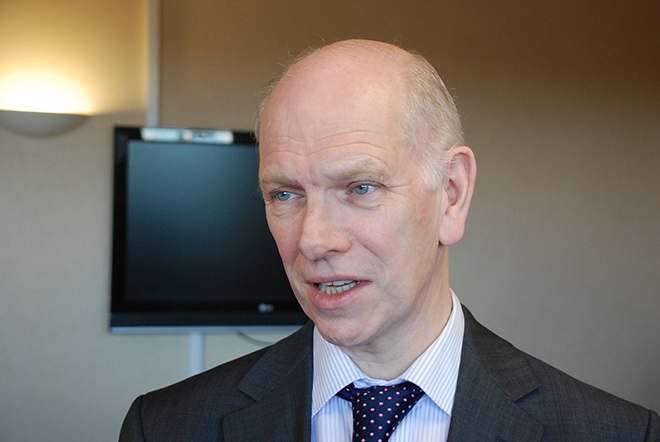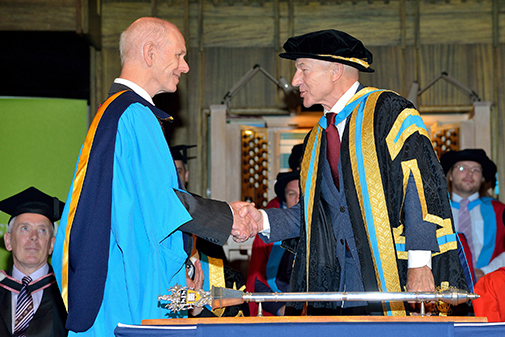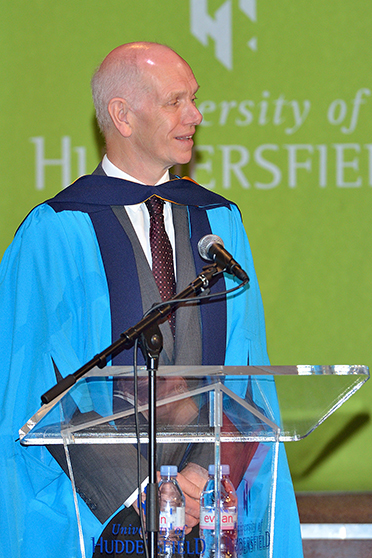Sir John applauds UK’s track record for excellence in innovation

Mon, 03 Oct 2016 13:40:00 BST
Sir John O’Reilly delivered the keynote lecture at the University’s 2016 European Researchers’ Night
 ► Sir John O’Reilly (left) is pictured receiving his honorary award from the University’s Emeritus Chancellor, Sir Patrick Stewart.
► Sir John O’Reilly (left) is pictured receiving his honorary award from the University’s Emeritus Chancellor, Sir Patrick Stewart.
ONE of the country’s most influential figures in science and technology delivered a highly positive message about the UK’s track record for excellence in innovation when he gave a lecture that capped a successful European Researchers’ Night at the University of Huddersfield.
But Sir John O’Reilly warned against complacency and said that it was of vital importance to encourage new streams of bright young people to study the STEM subjects – science, technology, engineering and maths. He also stressed the importance of breaking the artificial boundaries between disciplines and the role that creative arts had to play in the success of technological innovation.
Sir John – who in 2015 was awarded an Honorary Doctorate of the University of Huddersfield – is an engineer who has held wide portfolio of important posts in industry, academia and official bodies. He was invited to give a keynote lecture at the culmination of the EU-backed research night – subtitled “A journey of discovery” – that attracted 2,000 people to the University’s campus for a hugely-varied programme of activities and demonstrations.
Sir John’s lecture was titled “Full STEAM Ahead” – a reference to the inclusion of the Arts alongside the STEM subjects. He began his 55-minute talk by emphasising the global success of Britain’s research and Higher Education, citing a number of rankings that placed the UK at or near the top.
 “The UK has about one per cent of the world’s population. But we fund about three per cent of the world’s research and produce about six per cent of the research publications, which receive about 12 per cent of the citations. The UK has 16 per cent of the most highly cited papers. It is a massively strong performance,” said Sir John, who also stressed the importance of collaboration with overseas researchers. After the USA, Britain is the partner of first choice.
“The UK has about one per cent of the world’s population. But we fund about three per cent of the world’s research and produce about six per cent of the research publications, which receive about 12 per cent of the citations. The UK has 16 per cent of the most highly cited papers. It is a massively strong performance,” said Sir John, who also stressed the importance of collaboration with overseas researchers. After the USA, Britain is the partner of first choice.
The UK is often perceived to be less successful at innovation. “We tell ourselves this is our weak link, that we don’t turn our good research into stuff in the economy,” said Sir John. But he showed that Britain had made massive improvements and the Global Innovation Index – appraising the environment for innovation – placed the UK at No 2.
Sir John analysed some of the developments that helped explain Britain’s improvement in innovation, including stronger links forged between university researchers and industry. He acknowledged the University of Huddersfield’s track record in this, adding that it had benefits beyond the immediate problem that was being addressed. It could lead to whole new directions for research.
Emphasising the importance of working across traditional academic disciplines, Sir John attacked the “invidious” division between applied and pure science. He favours the term “frontier research”, meaning that it takes place “at and beyond the frontiers of understanding”, with an absence of disciplinary boundaries.
It was really important to build bridges, said Sir John, who showed how physicists, chemists and engineers had proved crucial to many recent medical advances.
Sir John also argued that the arts had a role to play in innovation, and showed how inspirational design had been crucial to the success of products such as the iPhone and iPod, created by British visionary Sir Jonathan Ive.
During his lecture, Sir John quoted from many leading thinkers – including Nobel Prize winners – and described the breakthroughs that had been made by several research projects carried out in partnership with industry.
He was introduced by the University of Huddersfield’s Director of Research and Enterprise, Professor Liz Towns-Andrews. After the talk, the University’s Vice-Chancellor, Professor Bob Cryan, invited questions from the audience and Sir John fielded a wide range, including his views on Brexit.
He said that was deeply worried by the implications, especially as Britain had been a big winner from EU-funding projects such as Horizon 2020 and FP7. “But the Government had said that it will continue to make money available for research and maybe there will be the freedom for more effective collaborations,” he added.







